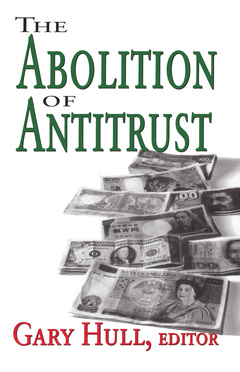The Abolition of Antitrust

The Abolition of Antitrust asserts that antitrust laws--on economic, legal, and moral grounds--are bad, and provides convincing evidence supporting arguments for their total abolition. Every year, new antitrust prosecutions arise in the U.S. courts, as in the cases against 3M and Visa/MasterCard, as well as a number of ongoing antitrust cases, such as those involving Microsoft and college football's use of the Bowl Championship Series (BCS). Gary Hull and the contributing authors show that these cases--as well as the Sherman Anti-Trust Act itself--are based on an erroneous interpretation of the history of American business, premised on bad economics. They equivocate between economic and political power--the power to produce versus the power to use physical force. For Hull, anti-trust prosecutions are based on a horrible moral inversion: that it is acceptable to sacrifice America's best producers.
The contributors explain how key antitrust ideas, for instance, "monopoly," "restraint of trade," and "anticompetitive behavior," have been used to justify prosecution, and then make clear why those ideas are false. They sketch the historical, legal, economic, and moral reasoning that gave rise to the passage and growth of antitrust legislation. All of the theoretical points in this volume are woven around a number of fascinating cases, both historical and current--including the Charles River Bridge, Alcoa, General Electric, and Kellogg/General Mills. This is a dynamic and accessible work that is not simply a polemical argument for a particular policy position.
Designed for the uninformed but educated layman, The Abolition of Antitrust also makes positive arguments in defense of wealth creation, business, and profit, explains the proper role of government, and offers a rational view of the meaning of contract and economic freedom.
Acknowledgments
Introduction
Part One: The Economics of Antitrust
1. Barriers to Entry
Dominick T. Armentano
2. The Philosophic Origins of Antitrust
John Ridpath
3. The False Profi ts of Antitrust
Richard M. Salsman
Part Two: The Legal History of Antitrust
4. Reversing Course:
American Attitudes about Monopolies, 1607-1890
Eric Daniels
5. Antitrust: The War Against Contract
Thomas A. Bowden
Part Three: The Morality of Antitrust
6. Antitrust: "Free Competition" at Gunpoint
Harry Binswanger
7. Antitrust is Immoral
Gary Hull
Appendix: Major Antitrust Legislation
Notes on Contributors
Index
Date de parution : 04-2005
15.2x22.9 cm
Date de parution : 12-2020
15.2x22.9 cm
Mots-clés :
Charles River Bridge; Common Carriers; Antitrust Laws; Pittsburgh Reduction Company; Seller Access; Sherman Antitrust Act; Antitrust Legislation; Charles River Bridge Case; Ayn Rand; Violated; Perfect Competition Theory; Shrugged; False Profits; Sherman Act; Perfect Competition; Antitrust Prosecution; Coercive Monopolies; Corporate Ceo; Perfect Competition Model; Potential Entrants; Competitive Market Process; Edward III; Cereal Brands; Antitrust Defendants; Atlas Shrugged



